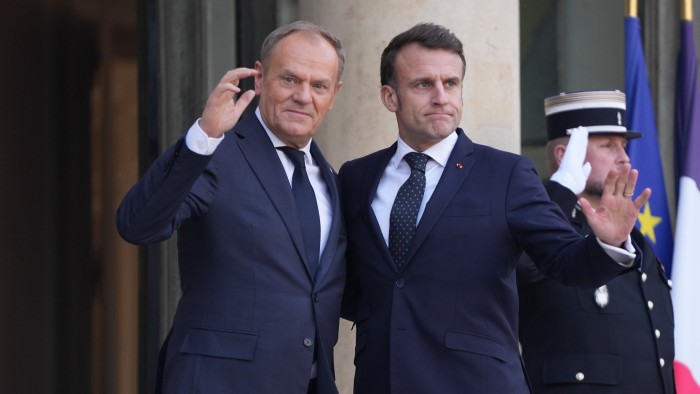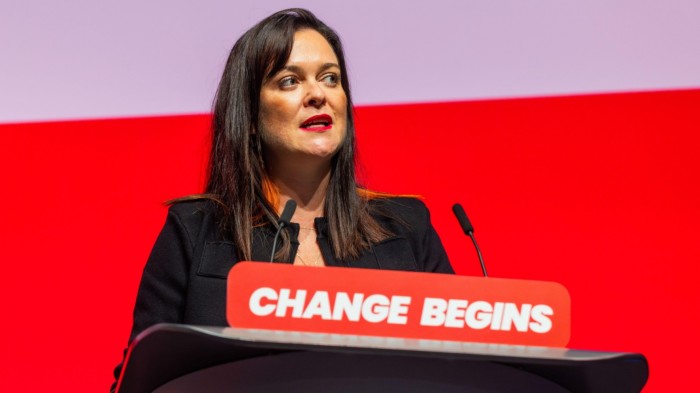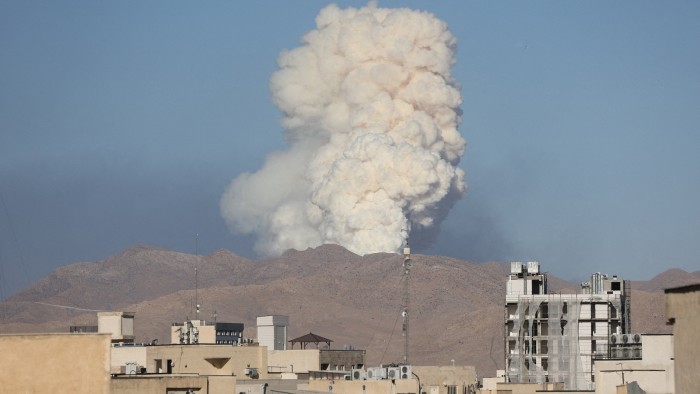Unlock the Editor’s Digest for free
Roula Khalaf, Editor of the FT, selects her favourite stories in this weekly newsletter.
France and Poland are set to sign a wide-ranging treaty covering defence and economic matters in the latest move by European countries to deepen military ties in the face of Russia’s aggression and uncertainty over US security guarantees.
The pact will be signed by French President Emmanuel Macron and Polish Prime Minister Donald Tusk on May 9. The pact was years in the making but gained renewed significance after US President Donald Trump’s overtures towards Russia and threats to withdraw American guarantees that have underpinned European security for decades.
“Tusk is also sending now a message to Washington, our main ally for so many years,” said Aleksander Olech, a security analyst at Defence24, a Polish think-tank. “It is a clear signal that Poland is not only dependent on the US but can also have other strong nuclear allies.”
The defence pact comes after Tusk recently suggested that Poland was open to exploring ways to be covered by France’s nuclear umbrella. Tusk also talked about Poland developing its own nuclear warheads to deter Russia.
France has for decades said that the “vital interests” that determine the use of atomic weapons have a “European dimension”. But Paris never defined the term, so as to keep the president’s options open and the adversary guessing — the key to nuclear deterrence.
A French official said Macron and Tusk were unlikely to reach conclusions on nuclear deterrence when they meet to sign their treaty in the northeastern French city of Nancy.
The agreement will cover a broad range of topics and give Poland a similar treaty to those that already unite France and its neighbours Germany, Italy and Spain. France also has narrower defence-focused treaties with other countries, such as the Lancaster House accord with the UK.
Tusk said earlier this week that the treaty would lead to “a very serious acceleration” of economic and military security on the continent.
On the economic front, France is hoping to play a bigger role in Poland’s energy transition away from coal, which still accounts for most of its electricity production.
The French official said the treaty also demonstrated how Paris saw Warsaw as an increasingly vital partner against the backdrop of war in Ukraine.
Macron has been on a diplomatic push to influence Trump in the Ukraine peace talks that the US administration is conducting with Moscow and Kyiv, and to stave off the threat of increased US tariffs on European imports.
Both are examples of the French leader’s long-held argument that Europe needs to be more autonomous and competitive to resist geopolitical tensions. Macron has worked closely with UK Prime Minister Sir Keir Starmer on how to protect Ukraine if Trump negotiates a ceasefire without offering US security guarantees.
Next Wednesday, Germany’s new chancellor Friedrich Merz will visit Macron in Paris and then Tusk in Warsaw. Merz has also signalled interest in the French nuclear umbrella and said that Europe could no longer count on the US for its protection.
France and Poland are upgrading a bilateral treaty that dates back to 1991, shortly after Poland emerged from communist rule and several years before it joined Nato and then the EU.
“The aim is to deepen and make operational the key elements of the Franco-Polish relationship, including evaluating threats, shared defence projects, and the extension of the conversation about strategic issues, including nuclear deterrence,” said the French official.
While France’s nuclear doctrine will not change, ways may be found within it to address the needs of EU allies such as Poland.
The Franco-Polish relationship soured in 2016, when the government led by the rightwing nationalist Law and Justice party cancelled a $3.5bn deal to purchase Caracal helicopters made by Airbus that had been agreed by the previous Tusk government.
Poland is Nato’s biggest spender, as a share of GDP, with 4.7 per cent of its GDP allocated to defence this year, although most of its orders have been placed with US and South Korean arms makers.
Under the new treaty, France could increase the sale of military equipment to Poland.
“Macron talks now about the need to buy European, but everybody understands that his priority is to sell French [equipment] to Poland and other EU partners,” said a former Polish defence official.
Airbus is competing to win Polish contracts for helicopters, transport aircraft and refuelling aircraft to service Warsaw’s growing fleet of fighter jets, which will next year also include F-35s. The Polish navy is also planning a major submarine purchase, with France among a handful of bidders.
Still, Tusk confirmed earlier this week that US company Westinghouse would build Poland’s first nuclear power plant, despite eleventh-hour French lobbying to select EDF instead.
“To be blunt, France hasn’t really been engaging with Poland and seeing us as a very good partner, but now that the US is changing its policies, they also see a chance to be more present here,” said Defence24’s Olech.







